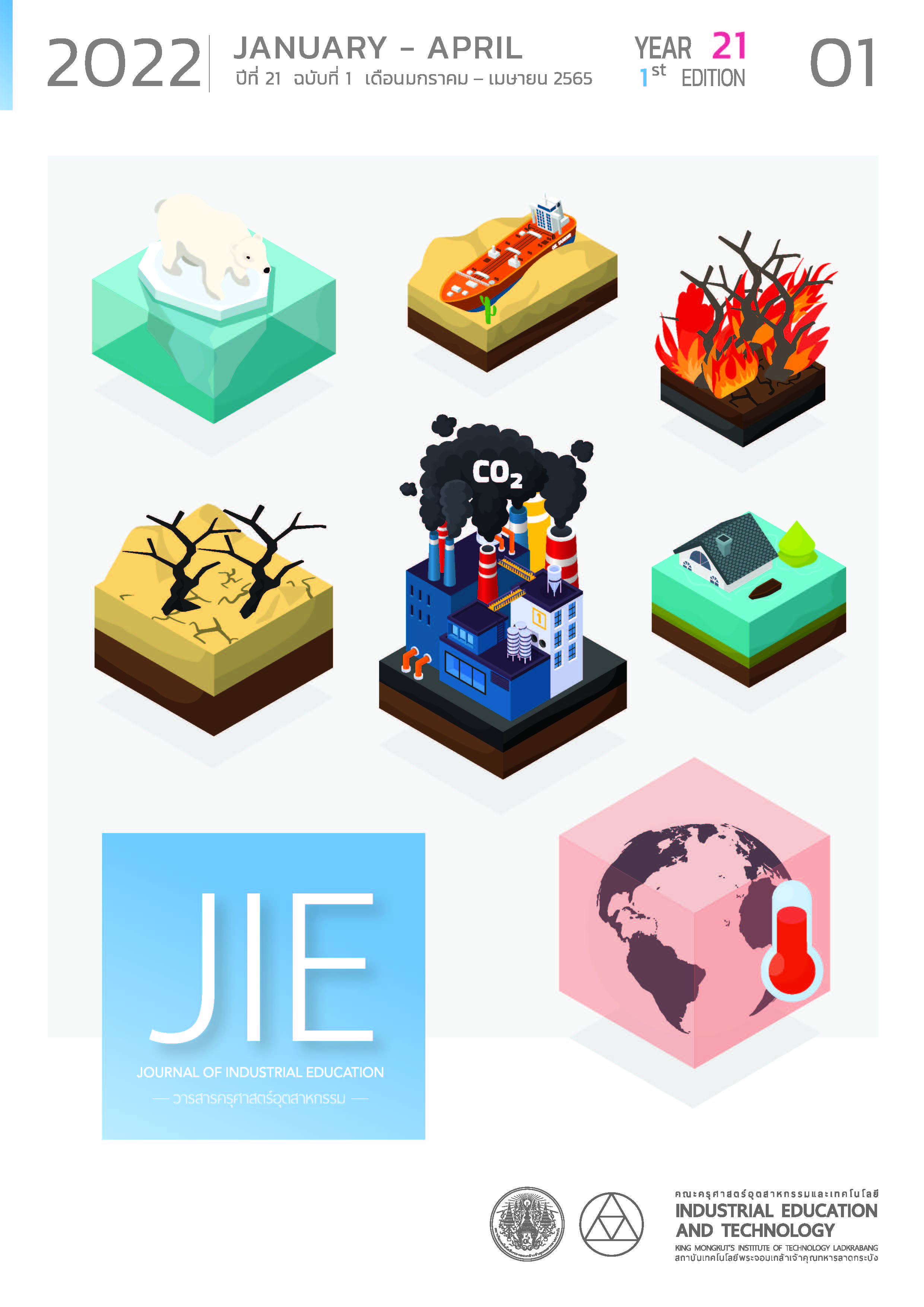PROBLEM-BASED LEARNING VIA CHATBOT FOR ADVANCE TOPIC IN COMPUTER COURSE
Keywords:
Problem-based learning; Chatbot, LINE application, Dialogflow, Python programmingAbstract
This research developed the problem-based learning management via chatbot. The sample employed in this research was a group of 20 third-year undergraduate students majoring in Computer Education selected by purposive sampling method, who enrolled in Advance Topic in computer course of education faculty, Suratthani Rajabhat University. We also assessed the learning achievement, evaluated the effectiveness of the lesson, and assessed the satisfaction towards the use of chatbot in teaching and learning process. This study is a research and development (R&D). The topic of Fundamental of Python Programming was chosen to develop as the lesson via chatbot on Dialogflow platform through LINE application. The developed chatbot is a keyword-based conversation. The Natural Language Processing (NLP) was used to translate the keyword question from a student and respond the answer according to the pattern of conversation that chatbot had set. The research instruments were 1) Lessons using chatbots, 2) problems or questions during learning, 3) pre-test and post-test, and 4) satisfaction assessment towards the use of chatbot. The statistics used to analyze the data were percentage, standard deviation (S.D.) and t-test. The results showed that 1) the learning efficiency (E1/E2) was higher than the standard criterion at 83.91/81.13, 2) the post-learning achievement of students treated by problem-based learning management via chatbot was higher than the pre-learning counterpart learning at the .05 level of statistical significance, and 3) the satisfaction towards the use of chatbot in teaching and learning process was at a high level (= 3.74, SD = 0.77).
References
Adamopoulou, E., & Moussiades, L. (2020). An overview of chatbot technology. In I. Maglogiannis, L. Iliadis, & E. Pimenidis (Eds.), Artificial Intelligence Applications and Innovations: AIAI 2020. 16th IFIP Advances in Information and Communication Technology (pp. 373-383, Vol. 584). Springer.
Arcos-Alonso, A., & Arcos-Alonso, A. (2021). Problem-based learning and other active methodologies as support for distance teaching during the COVID-19 pandemic. Cypriot Journal of Educational Sciences, 16(1), 277-287
Boonyapalanant, E. (2014). Problem based learning. Journal of Humanities and Social Sciences University of Phayao, 2(2), 3-7. (in Thai)
Carlander-Reuterfelt, D., Carrera, Á., Iglesias, C. A., Araque, Ó., Rada, J. F. S., & Muñoz, S. (2020). JAICOB: A data science chatbot. IEEE Access, 8, 180672-180680.
Chomrung, T., Chuntra, C., & Chaiso, P. (2021). Using assessment for learning and problem based learning to promote Grade 6 Student’s ability for mathematical problem solving. Journal of Legal Entity Management and Local Innovation, 7(6), 201-212. (in Thai)
Hiremath, G., Hajare, A., Bhosale, P., Nanaware, R., & Wagh, K. S. (2018). Chatbot for education system. International Journal of Advance Research, Ideas and Innovations in Technology, 4(3), 37-43.
Imcham, S., & Na-Songkhla, J. (2020). Effects of online scaffolding chatbot on computational thinking of tenth grade students with different personalities. STOU Education Journal, 13(1), 45-57. (in Thai)
Janarthanam, S. (2017). Hands-on chatbots and conversational UI development: Build chatbots and voice user interfaces with Chatfuel, Dialogflow, Microsoft Bot Framework, Twilio, and Alexa Skills. Packt.
Klinmalee, R., & Phonak, D. (2019). Problem-based learning with online learning for bachelor’s degree students. Journal of International Studies, Prince of Songkla University, 9(1), 59-79. (in Thai)
Lapkhuntod, K., Kaewkuekool, S., & Peasura, P. (2021). The learning management with problem based learning together web based instruction on aluminum welding for production technology education students. Journal of Industrial Education, 20(2), 1-11. (in Thai)
Muhammad, A. F., Susanto, D., Alimudin, A., Adila, F., Assidiqi, M. H., & Nabhan, S. (2020). Developing English conversation chatbot using dialogflow. In A. A. Yunanto, A. K. N, H. H. Muarifin, T. H. Muliawati, P. A. M. Putra, F. Gamar, & M. Ridwan. 2020 International Electronics Symposium (IES) (pp. 468-475). IEEE.
Owen, C. (2019). Problem-based learning. In K. Daniels, C. Elliott, S. Finley & C. Chapman (Eds.), Learning and Teaching in Higher Education: Perspectives from a business school (pp. 139-151). Edward Elgar.
Promla, P., & Krootjohn, S. (2020). The effect of using chatbot in blended learning for vocational certificate students in the colleges under the institute of vocational education northeastern region 1. Journal of Industrial Education, 19(2), 100-109. (in Thai)
Pusurinkum, S. (2006). Development of an information technology and communication knowledge sharing model using a collaborative learning approach for developing commination of practice of lab school teachers in Bangkok Metropolis [Doctoral dissertation]. Chulalongkorn University. (in Thai)
Ranavare, S. S., & Kamath, R. S. (2020). Artificial intelligence based chatbot for placement activity at college using dialogflow. Our Heritage, 68(30), 4806-4814.
Sabharwal, N., & Agrawal, A. (2020). Cognitive virtual assistants Using Google dialogflow: Develop complex cognitive bots using the Google dialogflow platform. Apress.
Sumikawa, Y., Fujiyoshi, M., Hatakeyama, H., & Nagai, M. (2020). Supporting creation of FAQ dataset for E-learning chatbot. In I. Czarnowski, R. Howlett, & L. Jain (Eds.), Smart Innovation, Systems and Technologies. Proceedings of the 11th KES International Conference on Intelligent Decision Technologies (KES-IDT 2019) (pp. 3-13, Vol. 142). Springer.
Wattanaklang, K., Kantathanawat, T., & Tungkunanan, P. (2021). Development of problem-based learning management plan and
e-learning on scratch programming for the secondary education Grade 7 Students. Journal of Industrial Education, 20(1), 10-18.
(in Thai)
Downloads
Published
How to Cite
Issue
Section
License
Copyright (c) 2022 Journal of Industrial Education

This work is licensed under a Creative Commons Attribution-NonCommercial-NoDerivatives 4.0 International License.
"The opinions and contents including the words in papers are responsibility by the authors."
"ข้อคิดเห็น เนื้อหา รวมทั้งการใช้ภาษาในบทความถือเป็นความรับผิดชอบของผู้เขียน"



